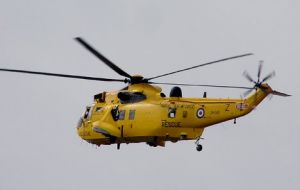MercoPress. South Atlantic News Agency
UK promotes Search & Rescue helicopter service to be provided by civilian crews
 UK Secretary of State for Transport, Justine Greening
UK Secretary of State for Transport, Justine Greening The Department for Transport has started the procurement process for a new UK-wide Search and Rescue helicopter service to be provided by civilian crews, it has been announced.
The Secretary of State for Transport, Justine Greening, announced to Parliament in a written statement that she wished to inform the House of the Government's intentions for the future of the Search and Rescue (SAR) helicopter service in the UK.
She said that following the cancellation of the SAR-H Private Finance Initiative in February, the Department for Transport will today publish a notice in the Official Journal of the European Union to commence procurement for a new UK-wide service contract. She added:
“My Right Honourable Friend the Defence Secretary has agreed that the new contract will provide a Search and Rescue capability provided by civilian crews, enabling our Armed Forces to focus activity on their front line operations.
”The Royal Navy and the Royal Air Force crews have shown great dedication and professionalism in delivering an exemplary Search and Rescue service for many years, and we owe them all great thanks for this.
“Looking forward, we are confident that, building on nearly 30 years of civilian service provided under contract to the Maritime and Coastguard Agency [MCA], a fully civilian service will be able to maintain the same standards in the future.”
The Department for Transport is procuring a contracted Search and Rescue helicopter service for the whole of the UK, for a period of approximately 10 years.
The Royal Air Force and Royal Navy will continue to provide Search and Rescue coverage until the replacement for this capability is in place, and Ms Greening said that it is her intention that the contract will require this to be the first part of the new service, adding:
“This will ensure that the Ministry of Defence is able to meet its previously announced intention to withdraw from service and retire its fleet of Sea King helicopters by March 2016. The replacement for the capability currently provided by the MCA will follow on from this. This transition will ensure continuity of service.”
Bidders for the future service will be able to put forward options which will utilise a mixed fleet of modern helicopters based on the capabilities required at each of the bases (such as range, carrying capacity and endurance). The services will be capable of delivery by different contractors providing complementary services.
The introduction of a modern fleet of fast, reliable helicopters will lead to major improvements in the capability available from the present mix of helicopters. Modern helicopters operating from ten full-time bases can not only continue to meet all current service requirements but also provide faster flying times to a large part of the UK Search and Rescue region, as well as providing a more reliable service. This will therefore be reflected in the new contract.
Ms Greening added that “it is my intention that Search and Rescue operations will cease at RAF Boulmer in 2015 and at MCA Portland when the interim arrangements that were announced in July expire. Other operations at RAF Boulmer will be unaffected by this.”
The award of the new contract is expected to take place in early 2013 to give the future service provider time to mobilise the new capability.





Top Comments
Disclaimer & comment rules-

Read all commentsMakes sense, as the bulk of the founderings, etc, are non-military.
Nov 29th, 2011 - 11:08 pm 0And if there is a military flare-up and a predominantly military need, they can be requisitioned along with their crews as part of the 'war effort'.
Commenting for this story is now closed.
If you have a Facebook account, become a fan and comment on our Facebook Page!